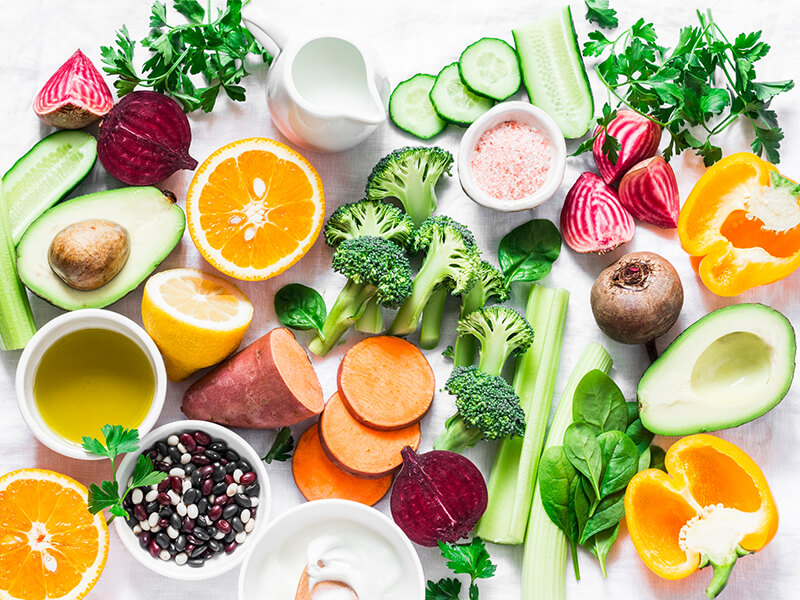
Introduction
Hormonal imbalance in women can lead to various health concerns, including irregular periods, weight fluctuations, mood swings, fatigue, acne, and fertility issues. A well-balanced diet plays a crucial role in regulating hormones naturally. Consuming nutrient-rich foods can support the endocrine system, stabilize blood sugar levels, and promote overall well-being. This article explores the best dietary choices to help balance hormones effectively.
Essential Nutrients for Hormonal Balance
1. Healthy Fats
Incorporating healthy fats into your diet is essential for hormone production and reducing inflammation.
- Avocados: Provide monounsaturated fats that support adrenal function and estrogen balance.
- Olive Oil: Contains anti-inflammatory properties to enhance hormone function.
- Coconut Oil: Aids in thyroid health and boosts metabolism.
- Flaxseeds & Chia Seeds: Rich in omega-3 fatty acids and lignans, which help regulate estrogen levels.
2. High-Fiber Foods
Fiber is vital for detoxifying excess hormones and supporting gut health.
- Leafy Greens: Spinach, kale, and Swiss chard promote estrogen metabolism.
- Legumes: Lentils, chickpeas, and black beans provide fiber and plant-based protein.
- Whole Grains: Quinoa, brown rice, and oats help maintain stable blood sugar levels.
3. Protein-Rich Foods
Adequate protein intake is necessary for hormone synthesis and energy regulation.
- Eggs: Packed with choline and vitamin D, crucial for hormone production.
- Fatty Fish: Salmon, sardines, and mackerel supply omega-3s that lower inflammation.
- Lean Meats: Chicken and turkey provide high-quality protein for hormonal stability.
- Tofu & Tempeh: Contain phytoestrogens that naturally balance estrogen.
4. Hormone-Balancing Fruits
Fruits are rich in antioxidants, vitamins, and minerals that support hormonal health.
- Berries: Blueberries, raspberries, and strawberries combat oxidative stress and boost adrenal function.
- Bananas: High in vitamin B6, which helps regulate mood-related hormones.
- Pomegranates: Assist in estrogen regulation.
- Citrus Fruits: Oranges and lemons promote liver detoxification and hormone balance.
5. Cruciferous Vegetables
These vegetables are known for their ability to support estrogen metabolism.
- Broccoli & Cauliflower: Contain indole-3-carbinol, which helps detoxify excess estrogen.
- Brussels Sprouts: Provide fiber and antioxidants to regulate hormones.
- Cabbage: Supports liver function for hormone detoxification.
6. Probiotic & Fermented Foods
A healthy gut microbiome is essential for proper hormone function.
- Yogurt: A natural source of probiotics that improve digestion and hormone balance.
- Kimchi & Sauerkraut: Aid gut health and estrogen metabolism.
- Kefir: Provides probiotics that enhance digestion and hormonal regulation.
7. Hydrating Foods & Beverages
Proper hydration is key for hormone function and overall health.
- Water: Helps flush out toxins and regulate metabolism.
- Herbal Teas: Green tea and chamomile tea reduce stress and inflammation.
- Coconut Water: Replenishes electrolytes and supports adrenal function.
Foods to Avoid for Hormonal Imbalance
Certain foods can negatively impact hormone balance and should be minimized.
- Processed Foods: Contain artificial additives and preservatives that may disrupt hormonal function.
- Refined Sugar: Leads to insulin resistance and hormonal fluctuations.
- Excess Caffeine: Increases cortisol levels and affects sleep patterns.
- Alcohol: Impairs liver function, making it difficult to eliminate excess hormones.
How to Implement a Hormone-Balancing Diet
- Eat Whole Foods: Focus on fresh, unprocessed ingredients to support natural hormone production.
- Incorporate a Variety of Nutrients: Ensure a balance of healthy fats, fiber, proteins, and antioxidants.
- Stay Hydrated: Drink plenty of water and herbal teas to aid detoxification.
- Manage Stress Levels: Engage in stress-reducing activities like meditation, yoga, and quality sleep.
Conclusion
A nutrient-dense diet is essential for balancing hormones naturally and improving overall health in women. Prioritizing healthy fats, fiber-rich foods, lean proteins, and antioxidant-packed fruits and vegetables can help regulate hormone levels effectively. Avoiding processed foods, refined sugars, and excessive caffeine further supports hormonal stability. Combining a well-balanced diet with a healthy lifestyle ensures long-term wellness. If symptoms persist, consulting a healthcare professional for personalized guidance is recommended.

